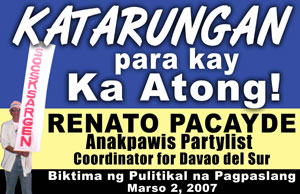
According to Kelly Delgado, spokesman for Karapatan in Southern Mindanao, Pacaide, �was a vocal critic of the human-rights violations perpetrated by the military elements in Davao del Sur.”
Pacaide was instrumental in bringing the survivor of the Feb. 8, 2004, Bulane massacre in Matan-ao, Davao del Sur, to the attention of Philip Alston, the UN rapporteur on extrajudicial killings who was in Davao City last Feb. 18 to hear the stories of the victims of abuses and political killings. (Read Alston�s preliminary report here.)
Pacaide was also a very vocal critic of the Arroyo administration. He was poor but that did not stop him from fighting for the farmers’ interests. Pacaide was the last to arrive at the national convention of Anakpawis in Manila in February because a boat fare was all he could afford.
Why was he killed?
“This is part of the plan by the armed forces and Arroyo to eliminate progressive party-lists,” said Edward Flores, coordinator for the Socskargen of Anakpawis. “The perpetrator could only be the Armed Forces of the Philippines�s death squads.”
The police director in Southern Mindanao, Chief Superintendent Andres Caro, was quick, however, to dismiss allegations that the government was behind the killing. He said thought that part of the angle the police are looking into is the alleged involvement of the government.
Other angles the police are looking into are Pacaide�s alleged involvement in the creation of a union in Nakayama Company in Digos City and his group’s opposition to the mining operations in Kiblawan.
But based on Pacaide’s records, he was only involved in the farmers’ struggles, including campaigning against the ill-effects of open-pit mining. His group asserts that he was not involved in the creation of a workers’ union.
According to Karapatan, Pacaide had been under military surveillance since 2004. The military has allegedly been building up a dossier on known progressive leaders in Digos, including Pacaide.
Editha Duterte, spokesman of Anakpawis in Southern Mindanao, disclosed earlier that the military�s 39th Infantry Battalion had been conducting operations in some areas in Davao del Sur, particulary in Sta. Cruz. During these operations, Duterte said, soldiers allegedly told residents not to vote for Anakpawis and its allied groups like Bayan Muna and Gabriela.
“Members and leaders of Anakpawis are continuously linked to the armed revolutionary movement,” Duterte bewailed.
Part of this campaign, she said, is the showing in the communities and schools of the documentary �Knowing the Enemy,� in which groups like Bayan, Bayan Muna, Free Legal Assistance, the National Union of Journalists of the Philippines, and the Catholic Bishops Conference of the Philippines, among others, are identified as having links with the Communist Party of the Philippines and its armed wing, the New People’s Army.
Duterte said that by linking these groups to the Communist movement, the Arroyo government and the military �are giving outright license to kill� their members and leaders.
Pacaide was the 78th victim of political killings in Southern Mindanao alone since Arroyo came to power in 2001. Within six years under the Arroyo administration, the number of victims of human-rights violations has skyrocketed. More activists have been killed under her regime than under any other after the dictator Ferdinand Marcos. (Marilou M. Aguirre/davaotoday.com)
[tags]davao today, philippines, davao del sur, digos, human rights, extrajudicial killings, melo commission[/tags]
Extrajudicial Killings









